“Hello? Anybody there?” Upon Prof. Takayuki Suzuki’s calling, several kittens immediately hop out of the groves and run towards him. As Prof. Suzuki opens his backpack and takes out a bowl full of cat food, the cats all start “meowing-”, as if to say, “Yay! Another feast is coming”. “This one is the friendliest one,” Suzuki says, while gently tickling the cat’s neck. The little cat slowly closes its eyes, and stretches out while enjoying the massage.
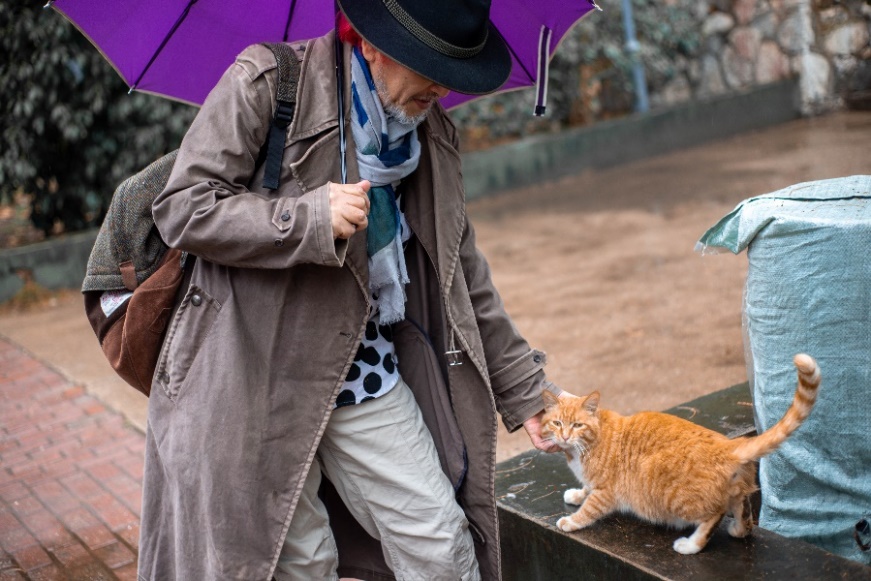
Prof. Suzuki with a cat
Suzuki joined the School of Urban Design of Wuhan University in February 2019. As an internationally renowned architect, novelist and critic, he has won the GUNZO Literature Award in 1987 for “Portrait in Number”, the Architecture Design Competition in 1988 and countless honors in his areas of expertise. Since coming to Wuhan University and working with his studio, warm relations have been established not only between him and his students, but also between him and the campus cats.
A cats’ savior in winter
Usually, students on campus would feed the cats. But after they have gone home for the winter vacation, the cold winter must be very severe for the cats. Being unable to return home to Japan for the vacation, Suzuki decided to take care of the cats and become their dependable friend.
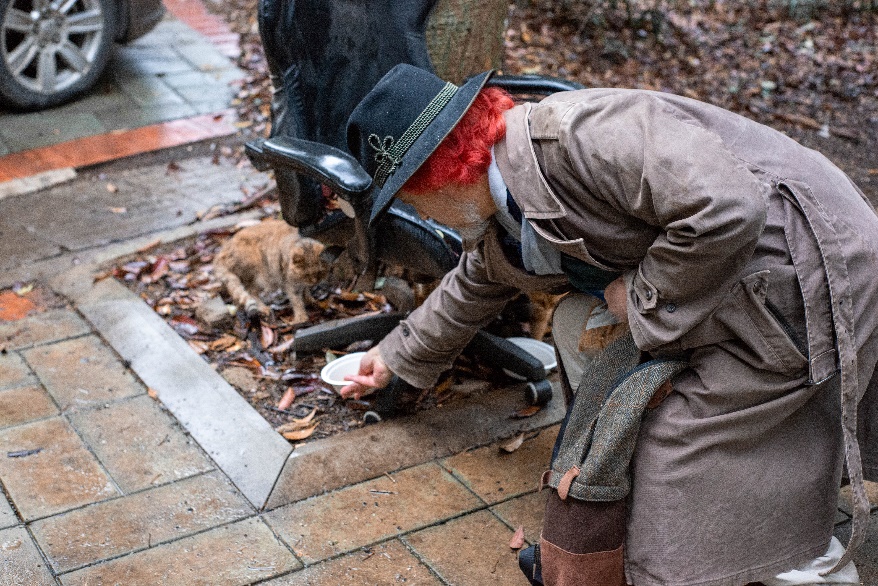
Suzuki feeding a cat
However, feeding the cats is not easy work. There are five places around Suzuki’s home where cats often get together. In order to prepare enough food, he repeatedly bought big, heavy packs of cat food at a supermarket far away from school. He also worried whether each of the cats could have a meal in that some strong cats may act unkindly towards the smaller and weaker ones in their surroundings.
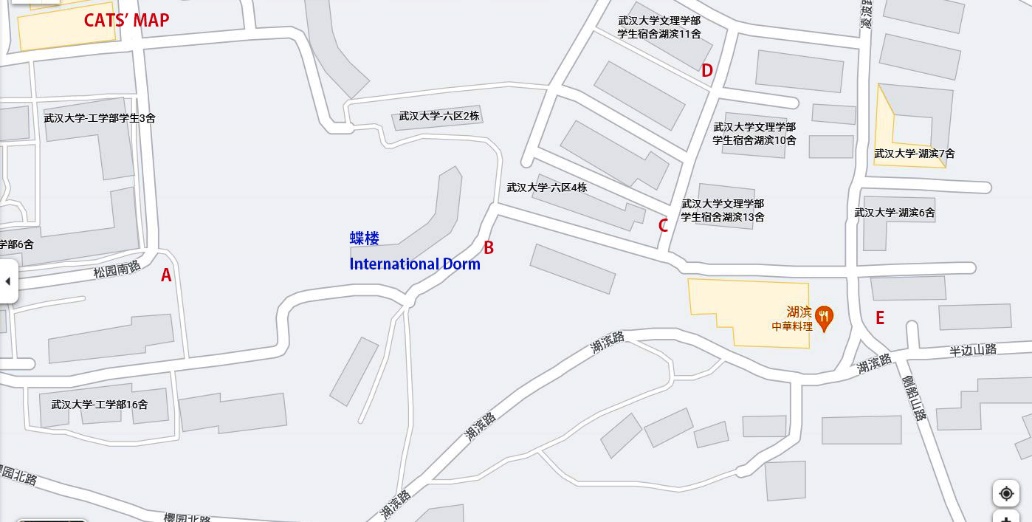
Suzuki’s map for feeding the cats, with A-E identifying the five feeding locations
Suzuki’s care must have warmed these cats in the freezing winter. Gradually, they established a close rapport, and even the most cautious cat started to change. One such kitty used to have a threateningly tight neck bandage, and Suzuki wanted to remove it but always failed. “I talked to the other cats who had already become very familiar to me, ‘hey, please tell the kitty that the man wearing a hat is just wanting to remove your neck bandage. You should trust him.’ I thought these cats said, ‘OK, we will persuade the kitty.’” Only two days later, the kitty sat in front of him, showing its back, which allowed Suzuki to successfully remove the bandage with scissors.
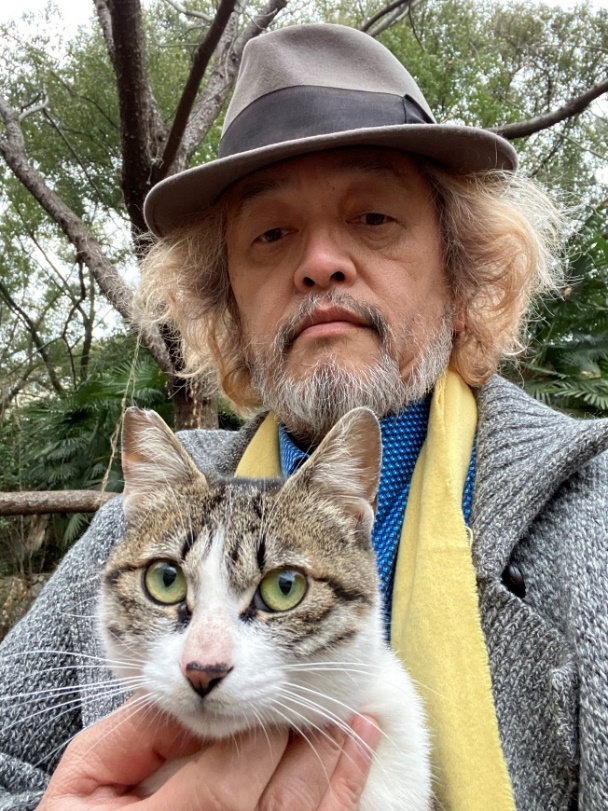
Suzuki’s selfie with the cat with the neck bandage
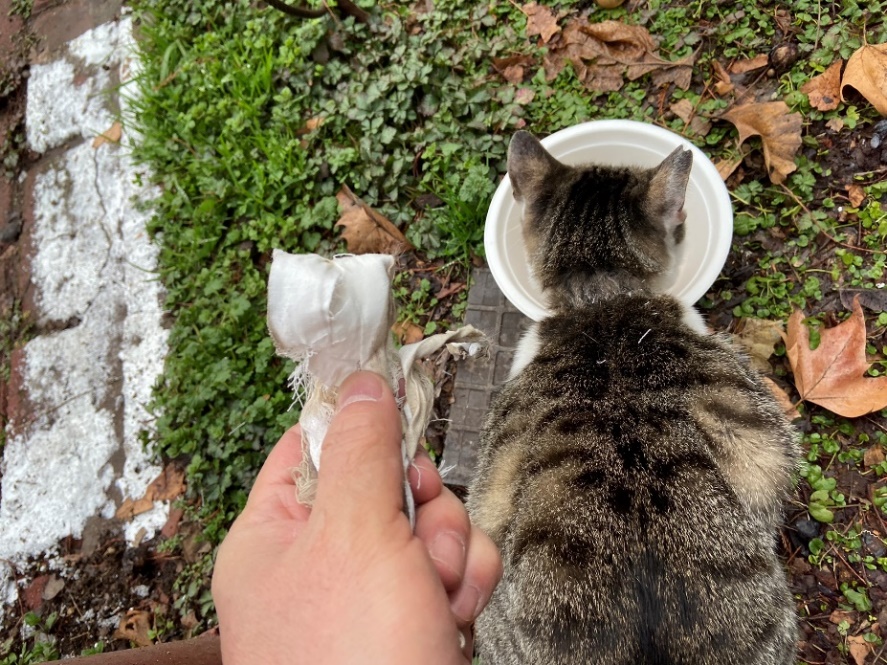
The neck bandage was taken off
A gentle glance, a relaxing stretch, a sweet “meow” … The cat’s cute reactions not only witnessed their growing friendship with Suzuki, but also filled his long winter days. “I lost a chance to go back to my homeland Japan and only a few friends stayed around me, but I never felt lonely because the cats were always there,” he said gratefully. He believes that human beings can always learn things from this adorable creature, whether in daily life or in a professional sense. “When talking to my students about designing, I also use the cats’ perspective to inspire them.” Suzuki said, showing us the cats’ images on his shirt and socks. From the pride and satisfaction on his face, his affection for cats was evident.

Suzuki in his cat shirt
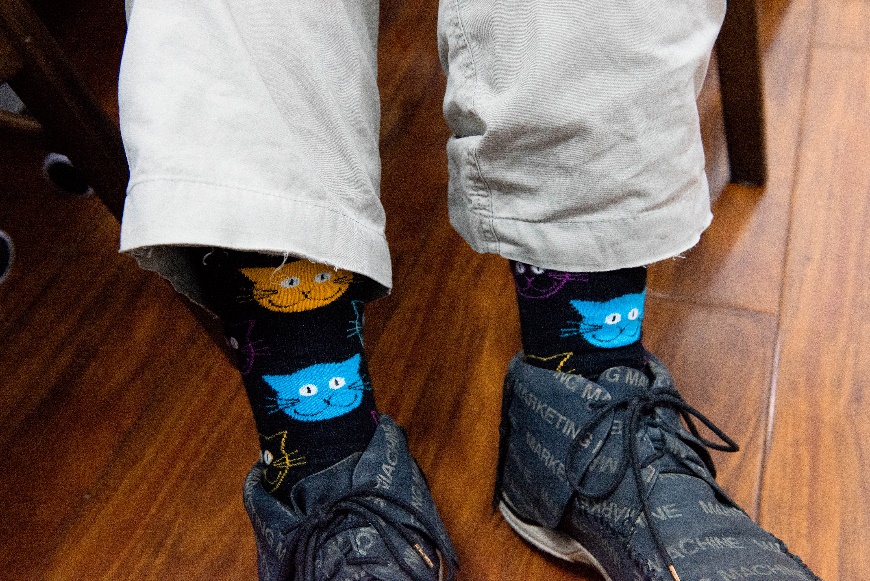
Suzuki’s socks with cats’ images
“Maybe I have been successful in keeping some of the cats in good condition. And I hope it would be so for the students returning to campus,” Suzuki said. In his eyes, cats are also important friends for the students. He cares about the cats as much as he cares about the students of Wuhan University.
“I love the passion of WHU students”
“During my three years in Wuhan University, in working with people here, I have found that the students here are nice, kind, and gentle.”

One of Suzuki’s designs
Once at the end of May in 2019, before Suzuki went to class, a sudden severe stomachache blocked his way. Unable to speak Chinese, he could not contact the hospital, so he called one of his students for help and several students immediately called the ambulance for him. Thanks to their quick action, Suzuki received emergency surgery at once.
After the surgery, he had to stay in hospital for two weeks with his wife there to take care of him, during which time his students brought food and flowers on visits. They had conversations with his wife on the way to the exit. After they had gone, she told Suzuki, “A student said ‘thank you’ to me. I was surprised and said ‘I thank you because you saved my husband’s life and came to visit him’. But the students said ‘Thank you because you care for our teacher,’” which deeply moved Suzuki and his wife.
When asked about his impression of students in Wuhan University, Takayuki mentioned the word “passion”. “I think there is a specific passion in them, a passion for learning new knowledge. I love that passion.”
Suzuki’s stories in WHU convey the emotional connection between foreign teachers and WHU. Whether this connection is between Suzuki and cats or between him and his students, it is the purest kindness in life, a desire for unity and to foster interconnection, regardless of species or nationality.
Photo by Lin Yangjie, Takayuki Suzuki
Edited by Chen Jiaqi, Qin Zehao, Qin Shihan, Zou Xiaohan,Sylvia and Hu Sijia


